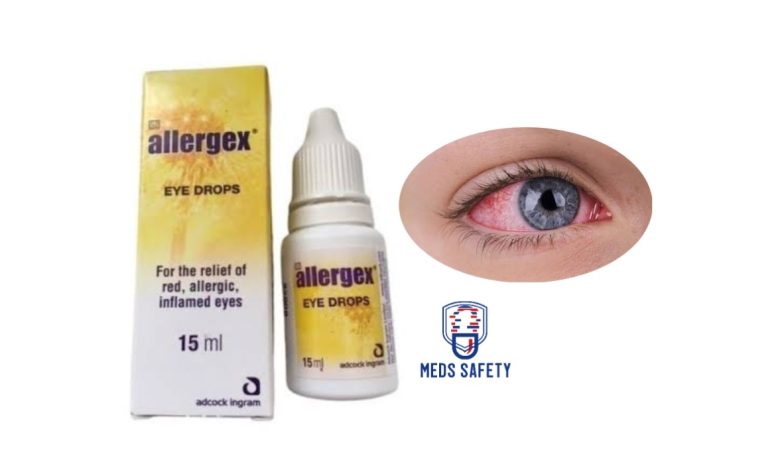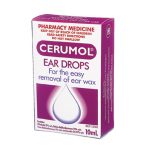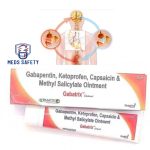Allergex Eye Drops: Uses, Dosage, Benefits Side Effects, Interactions

What is Allergex eye drops used for?
Allergex Eye Drops is a brand of Oxymetazoline Hydrochloride, it works by narrowing the blood vessels in the nose area to reduce swelling and congestion. Oxymetazoline is a vasoconstrictor that can be specifically formulated to relieve redness in the eyes.
Allergex Eye Drops also work by narrowing the blood vessels in the eyes, reducing redness, and providing temporary relief for eye redness caused by minor irritations, allergies, or fatigue. However, it’s important to note that these Allergex Eye Drops are intended for short-term use and should not be used for an extended period without consulting a healthcare professional.
As with any medication, it is crucial to follow the instructions provided by the manufacturer or your healthcare provider when using Allergex Eye Drops. If you have persistent or severe redness in your eyes, it is advisable to consult with an eye doctor or healthcare professional for a proper evaluation and appropriate treatment recommendations.
How to use Allergex Eye Drops
If you have been prescribed or purchased Allergex Eye Drops for the relief of eye redness, here are some general guidelines on how to use them:
- Wash your hands thoroughly with soap and water before handling the eye drops.
- Gently shake the bottle to ensure the solution is well mixed.
- Tilt your head back or lie down on a flat surface, whichever is more comfortable for you.
- Gently pull down your lower eyelid to create a small pocket.
- Hold the dropper tip close to your eye without touching it.
- Squeeze the prescribed number of drops into the pocket formed by the lower eyelid. Be careful not to touch your eye or eyelashes with the dropper tip to avoid contamination.
- Release the lower eyelid and close your eye gently.
- Keep your eyes closed for a minute or two to allow the eye drops to spread evenly across the eye surface.
- If you need to apply the drops to both eyes, repeat the process for the other eye.
- After using the eye drops, replace the cap tightly on the bottle.
- If you are wearing contact lenses, it is generally recommended to remove them before using the eye drops. You can usually wait 10 to 15 minutes after applying the drops before reinserting your contact lenses.
- Avoid touching the dropper tip or allowing it to come into contact with any surfaces to prevent contamination.
Follow the dosage instructions provided by your healthcare professional or as indicated on the product packaging. Do not exceed the recommended dose unless instructed to do so by your doctor.
If you have any questions or concerns about the use of Allergex Eye Drops, consult your healthcare provider or pharmacist for further guidance.
Remember, it’s always important to use medications as directed and consult a healthcare professional if you have any specific questions or concerns about your eye health or the use of eye drops.
Allergex Eye Drops Benefits
The primary benefit of using Allergex Eye Drops is the temporary relief of eye redness caused by minor irritations, allergies, or fatigue. The vasoconstrictive properties of Oxymetazoline help to narrow the blood vessels in the eyes, reducing redness and providing a more clear and bright appearance to the eyes.
Here are some potential benefits of using Allergex Eye Drops:
1. Redness reduction: Allergex Eye Drops are specifically designed to reduce redness in the eyes. They work quickly to constrict the blood vessels on the surface of the eye, leading to a decrease in redness and a more refreshed appearance.
2. Quick relief: Allergex Eye Drops generally provide rapid relief from eye redness. The effects can be noticeable within minutes after application.
3. Temporary solution: Allergex Eye Drops offer a temporary solution for eye redness. They provide relief for a limited period, typically a few hours, and are not intended for long-term use.
4. Non-drowsy: Unlike some oral medications that may cause drowsiness, Allergex Eye Drops are typically non-drowsy when used as directed. They allow you to go about your daily activities without significant sedation.
5. Over-the-counter availability: Allergex Eye Drops are available over the counter, making them easily accessible for individuals seeking relief from eye redness.
It’s important to note that while Allergex Eye Drops can provide temporary relief for eye redness, they do not treat the underlying cause of the redness. If you have persistent or recurrent eye redness, it’s advisable to consult with an eye doctor or healthcare professional for a proper evaluation and appropriate treatment recommendations. They can help identify and address the root cause of the redness.
Side Effects of Allergex Eye Drops
While Allergex Eye Drops can be effective in reducing eye redness, they can also have potential side effects. It’s important to be aware of these possible side effects and to use the eye drops as directed by your healthcare professional or as indicated on the product packaging. Common side effects of Allergex Eye Drops may include:
1. Temporary stinging or burning sensation in the eyes: Some individuals may experience a mild stinging or burning sensation upon application of the eye drops. This usually subsides quickly.
2. Dryness or irritation: Allergex Eye Drops can cause temporary dryness or irritation in the eyes. If you experience persistent or severe discomfort, discontinue use and consult your healthcare professional.
3. Temporary blurred vision: In some cases, Allergex Eye Drops can cause temporary blurred vision or difficulty focusing immediately after application. This effect typically resolves within a short period.
4. Rebound redness: Prolonged or excessive use of Allergex Eye Drops can lead to rebound redness, where the redness in the eyes worsens after the initial improvement wears off. This can occur if the eye drops are used for longer than recommended or more frequently than directed. It is essential to follow the recommended dosage and duration of use.
5. Allergic reactions: Although rare, some individuals may experience an allergic reaction to Allergex Eye Drops. If you develop symptoms such as severe eye itching, swelling, rash, or difficulty breathing, seek immediate medical attention.
6. Increased intraocular pressure (IOP): Allergex Eye Drops can potentially increase intraocular pressure in some individuals. This effect is more relevant for individuals with pre-existing glaucoma. It is important to inform your healthcare professional if you have a history of glaucoma or other eye conditions.
These are not all possible side effects of Allergex Eye Drops. If you experience any unexpected or severe reactions after using the eye drops, it is important to discontinue use and consult your healthcare professional for further evaluation and guidance.
Additionally, it is crucial to inform your healthcare professional about any other medications you are taking, as there may be potential interactions between Allergex Eye Drops and certain systemic medications.
Can I use Allergex Eye Drops for itchy eyes?
No, Allergex Eye Drops are primarily indicated for the temporary relief of eye redness caused by minor irritations, allergies, or fatigue. While itchiness can be associated with eye redness, Oxymetazoline eye drops may not be the most appropriate choice for addressing itchy eyes.
If your primary concern is itchy eyes, it is generally recommended to use eye drops specifically formulated to relieve itchiness. These eye drops often contain antihistamines or other ingredients that target the itching sensation directly. Antihistamine eye drops can help alleviate itching caused by allergies or other eye irritants.
To address itchy eyes effectively, it is advisable to consult with an eye doctor or healthcare professional. They can evaluate your condition, determine the underlying cause of the itchiness, and recommend appropriate treatment options, which may include specific eye drops suitable for itching.
Remember, self-diagnosis and self-medication may not always be accurate or provide the desired relief. Consulting a healthcare professional ensures that you receive appropriate guidance and treatment tailored to your specific needs.
Can I use Allergex eye drops for my baby?
No, Oxymetazoline eye drops are typically not recommended for use in babies without the guidance and approval of a healthcare professional. The safety and appropriate use of medications, including eye drops, in infants and young children require careful consideration and professional advice.
It is crucial to consult with a pediatrician or an eye doctor before using any medication, including eye drops, on a baby. They can assess the baby’s specific condition, evaluate the underlying cause of any eye symptoms, and recommend appropriate treatment options.
In the case of eye redness or itchiness in a baby, it is especially important to seek professional guidance to determine the cause of the symptoms and to identify the most suitable treatment approach. Using medications or eye drops meant for adults or older children without proper medical supervision can potentially be harmful to a baby’s delicate eyes.
Always prioritize the health and safety of your baby by consulting with a healthcare professional who can provide accurate advice and recommendations for the specific needs of your child.
Interactions
Allergex Eye Drops, when used as directed, are typically not associated with significant systemic interactions. However, it’s always important to inform your healthcare professional about any other medications you are taking to ensure there are no potential interactions or contraindications.
While Allergex Eye Drops primarily act locally on the eyes, some systemic absorption can occur, albeit in minimal amounts. This minimal absorption generally reduces the risk of systemic interactions with other medications.
However, certain medications may potentially interact with Allergex Eye Drops, especially if they are taken orally or have systemic effects. These interactions could occur if the medication affects blood pressure, heart rate, or blood vessel constriction.
To ensure your safety and avoid any potential interactions, it is recommended to inform your healthcare professional about all medications you are currently taking, including prescription medications, over-the-counter drugs, and supplements. They can evaluate the specific medications you are using and provide guidance on any potential interactions or precautions that need to be taken.
It’s important to follow your healthcare professional’s advice and guidance regarding the use of Allergex Eye Drops, particularly if you are taking other medications simultaneously.





